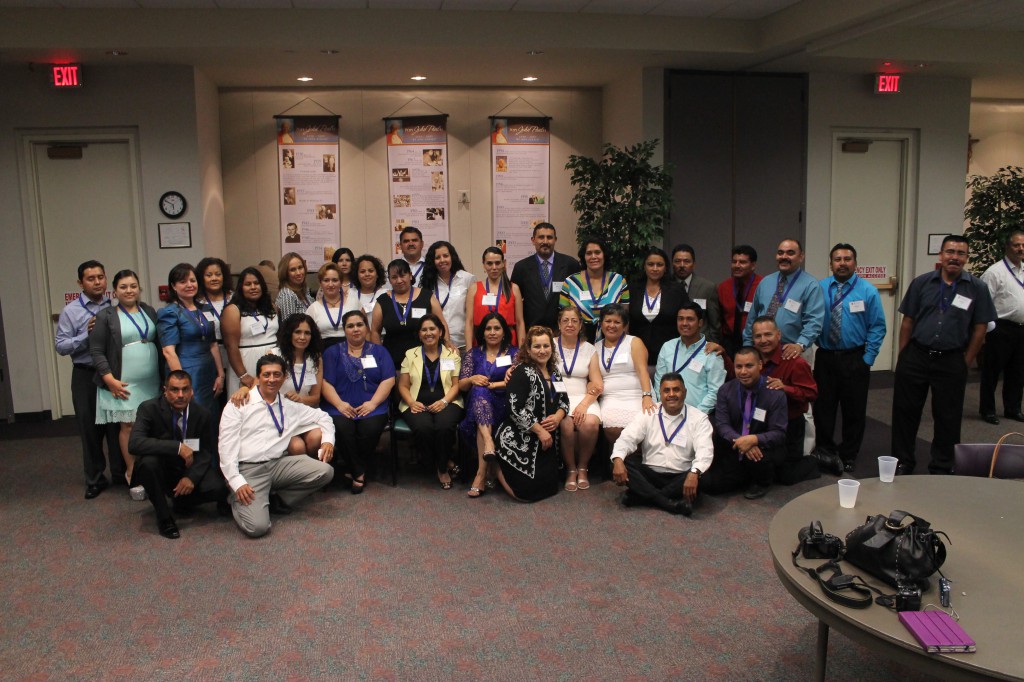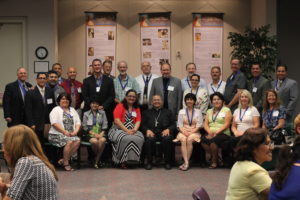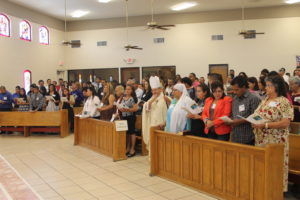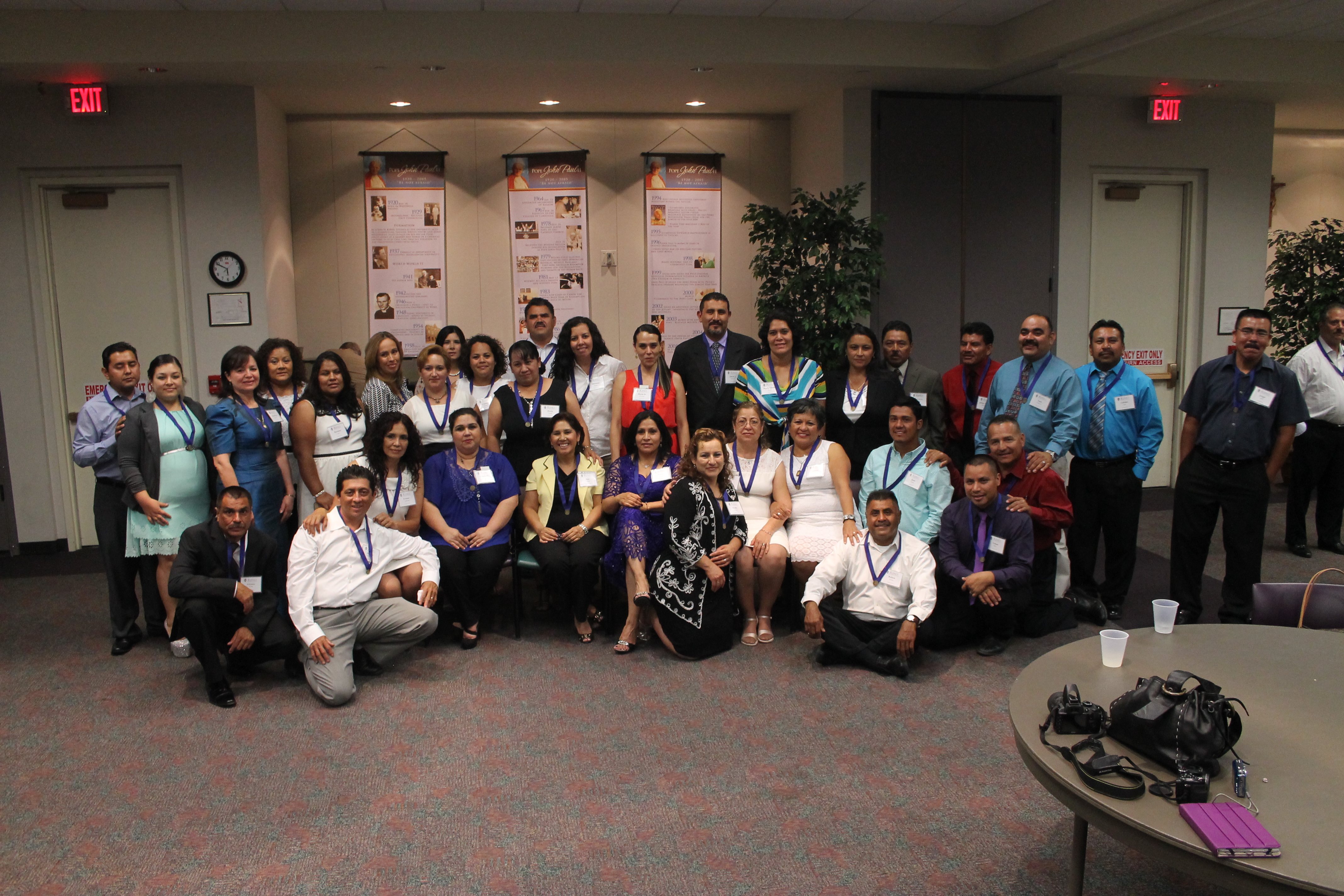
They’re the newest class of disciples and they’re more than five times the size of Jesus’ crew. They’re ready to share, and when necessary, defend the faith.
The 66 men and women who graduated from the diocesan Kino Catechetical Institute explored college-level catechesis that Bishop Thomas J. Olmsted said is “both content-oriented and deeply personal.”
Their studies culminated during a June 4 graduation Mass at St. Mary’s Basilica in Phoenix following two years of 14 rotating undergraduate level courses. Students took a deeper look at the Bible, sacraments, liturgy, Theology of the Body and Catholic moral responsibility. Priests and other highly trained laity taught each course in English or Spanish.
Steve Greene, director, said Kino is “a huge dividing point” for its students. They’re able to see their life as before and after Kino. Graduates are a wide range of converts, those coming straight from the Rite of Christian Initiation for Adults, cradle Catholics and “reverts.”
“The goal for our program is to help them articulate and defend their faith and be confident enough in their faith to go out into the New Evangelization,” Greene said.
[quote_box_right]Kino Catechetical Institute
Catholic adults 18 and older are invited to enroll for courses in English or Spanish. The faith formation program helps students understand, articulate and defend the faith with confidence and charity.
Cohorts meet weekday evenings for two years with a new Thursday morning option beginning in August. Register by July 1[/quote_box_right]He described Kino enrollment as a discernment process because there’s always a reason students are led to the formation. Sometimes it’s to strengthen their skills as a parish leader. Other times it’s to equip them to start a ministry or simply to have a solid foundation when people challenge them on issues like contraception.
Maria Amezcua, a St. Jerome parishioner who graduated from Kino’s Spanish program, knows that she isn’t meant to keep her newfound knowledge to herself — it’s meant to be shared with the community. She plans to keep serving in RCIA because Kino gave her the tools to help others become saints. Amezcua began Kino with the hopes of simply deepening her relationship with Christ and living in accordance with the Church.
“Now that I drink the water that gives life. Now I will be able to give it to everybody,” Amezcua said.
Bishop Eduardo A. Nevares offered similar thoughts during the bilingual graduation Mass. He said graduates are called to take the kingdom of God, via their peace and joy, to all that they meet. They might be finished with classes, but another mission always awaits, the bishop said.
“You’re just starting on your life journey with the Lord to be a better missionary, to be a better witness with your families… and all that you meet,” the bishop said.

That’s the motive that led David Tucker to Kino’s English program. The St. Timothy parishioner came out of an ACTS retreat — the weekend focuses on adoration, community, theology and service — on the feast of Pentecost two years ago asking himself what was next. Within a week, three people asked if he ever considered Kino.
Tucker said the experience helped him piece together everything he learned in Catholic school in a comprehensive manner. He understood that adult Catholics are responsible for understanding and deepening their knowledge of the faith so they can more effectively carry it out. Tucker even took some faith-sharing buddies to a class here and there. One of them just finished his first year of Kino.
“I was humbled by how much I really didn’t understand the faith and how deep and how solid it is,” Tucker said.
The more he delved into any subject, the more truth he found, along with a growing desire to obey anything the Church said. Tucker now finds himself equipped to lovingly preach the Gospel, confident that he has the Truth at his fingertips.
“I would do it a thousand more times,” said Ana Luisa Martinez de Carrillo, a St. Jerome parishioner.
She enrolled in Kino after feeling not as prayerful as she could be. Carrillo realized life is about doing God’s will with love, even in mundane tasks such as cooking and childcare. She found the Catechism and every other textbook to be a beautiful prayer and hopes others give Kino a try.
“I feel like my feet are on cement, not because I’m a prisoner, but because I want to be there,” Carrillo said.
She learned that everyone plays a unique and distinct role in each other’s salvation.
Agua Viva

Growing together in faith and community is what 169 students at five largely Spanish-speaking parishes did through Kino’s Agua Viva program. Students at St. Augustine, Sacred Heart and St. Mark — all in Phoenix — along with Queen of Peace in Mesa and Our Lady of Guadalupe in Guadalupe, spent two years in a systematic and integral faith formation program at their respective parishes.
“The whole idea is to build community among themselves and network,” said Sr. Maria Celia Molina, SSND, said. She oversaw their formation along with peer leaders. The idea is to build community, network and share resources and people.
“We’re really grateful that God has touched everyone’s hearts,” said Magdalena Gaspar, an Agua Viva teacher at Queen of Peace. She saw students learn how to care for each other and grow closer.
Attending class was tough for Abel de la Torre, a St. Augustine parishioner. He had a heart attack during his time as a student and other surgeries, but he yearned for class time.
“It was a support for me because I don’t have my family here. My family lives in Mexico,” de la Torre said through a translator. “Those in class gave me the support that I need.”







